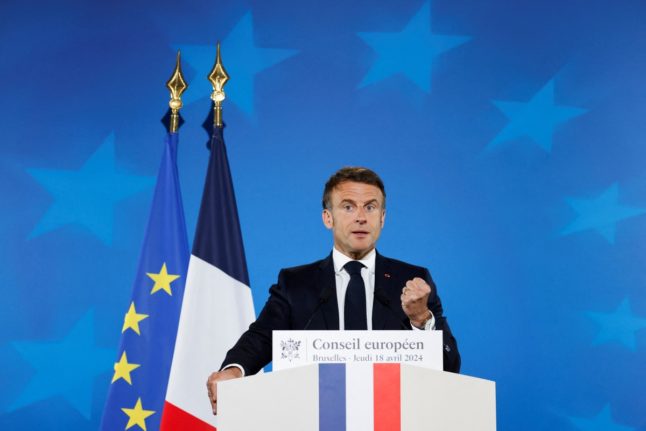There are two ways (at least) of viewing the second round of France’s presidential election on Sunday.
Some commentators see a confrontation of “bloc versus bloc”; of people versus elites; of anti-System versus System. They imagine that it will be a battle between an anti-Macron front and an anti-Le Pen front.
They are wrong, luckily.
If you combine the votes for all “anti-system” candidates of both Right and Left in the first round you reach 58.7 percent of the total. How could Emmanuel Macron be re-elected this weekend if the “anti-system” voters were a coherent, political force? He would not have a chance.
As it stands, the opinion polls give Macron a lead of between 9 and 12 points. How can that be?
The answer is that “bloc versus bloc”, “people versus elites” is an incomplete and misleading description of the French electoral battlefield.
I have been arguing for months – in this column and elsewhere – that the old French Right-Left system has mutated into a muddled pattern of three broad tribes: the scattered Left and the Greens; a pro-European, consensual Centre; and a nationalist-populist, anti-migrant and anti-European Right.
I thought that these three blocs would become clearly defined and maybe develop party structures in time for the next presidential election in 2027. I was wrong. Events have moved much more rapidly.
If you assemble the first-round votes along my new fault lines, France divided on April 10th into three, almost equal parts. The six candidates of the Left got 32.2 percent; Macron’s Centre and the Valérie Pécresse rump of the centre-right got 32.4 percent; the three candidates of the nationalist Right got 32.5 percent.
The remaining 3 percent went to the eccentric and egocentric Jean Lasalle, a man who defies all categorisation.
The geology of this new electoral landscape is unstable. The boundaries can be drawn in different ways. (Should all the remaining Pécresse be counted as part of the Centre?) Each camp or tribe is internally divided. Each tribe contains parts of the “elite” and parts of “the people”.
Nonetheless, I believe that this “Tripartite” pattern is a more accurate and useful description of the politics of France in 2022 than People v Elites schema beloved of some French philosophers, politics professors and commentators.
The division into three broad tribes explain why Macron will win on Sunday. However much they may detest Macron, far more members of the Left/Green tribe will support the Centre than will vote for the Far Right. A big chunk will, of course, abstain or stay at home.
The People v The Elite obsession is not entirely an illusion. Marine Le Pen’s electorate is heavily weighted towards the poor and the struggling, the less educated and the unhappy. One in three low-income voters – 33.8 percent – cast a ballot for her on April 10th.
The rest of the so-called “popular bloc” is more disparate: it is neither all “popular” nor really a bloc.
Le Pen’s far right rival Eric Zemmour appeals little to the suffering working class or the alienated rural voter. His electorate is dominated by a well-heeled and well-educated part of the “elite” which detests the pro-European and racially tolerant consensus.
Mélenchon’s electorate, both his core vote and his enlarged 22 percent broader Left vote on April 10th, is even more difficult to categorise. It contains many young people from “elite” backgrounds who have passionate left-wing, ecological and anti-racist opinions. It includes only one in four working class voters but two-thirds of all Muslim voters. It includes relatively few voters in rural areas or the outer, hard-scrabble suburbs.
Equally, the 41.3 percent “elite” or Macron-dominated bloc includes 20 percent of working class voters. His vote was less Metropolitan than it was in 2017. He did surprisingly well in parts of rural France.
In my own village in Normandy, where Le Pen topped the first-round poll in 2017, Macron came first on April 10th with just over 30 percent. That was a great surprise to me and that of most other local people I have spoken to.
There used to be a hidden Le Pen vote in rural France. Now it appears that there is a hidden Macron vote.
The three-way electoral split should, in theory, make for difficult parliamentary election for a newly re-elected President Macron in June. I doubt it. His one third of the popular vote, if it remains united, will benefit from the oddities of the parliamentary election system in which three or four candidates can fight the second round. Then the first-past-the-post wins.
Following the calamitous performance of Les Républicains and Pécresse, the Macron-dominated Centre is well-placed to swallow up much of what remains of the moderate, pro-European centre-right. If they can resolve their own quarrels, then Macron’s allies could get a working majority in the new parliament
The Left tribe, or collection of tribes, is now dominated by the hard-left Jean-Luc Mélenchon. They may scatter once again before the parliamentary elections on June 12th and 19th. If the Left does manage some kind of electoral alliance, it could win a biggish chunk of seats in the new National Assembly.
The Far Right seems irreconcilably divided between its Le Pen and Zemmour wings. If they run separately in the assembly elections – as seems inevitable – they will underperform badly.
Conclusion…
Macron will be re-elected on Sunday. He will also get a parliamentary majority.
Wednesday evening’s televised debate may shift his winning margin, upwards or downwards a little. It won’t change the result.
Le Pen will do better in the debate this time. She could hardly do worse than she did in 2017. The fundamentals of her programme – on economy, on Europe, on climate change, on race and migration – are just as incoherent and dishonest as they were five years ago.
If Macron teases out the contradictions (without being too aggressive) he should go on to win on Sunday by an eight to ten point margin.
And then his troubles will begin. The new political landscape means that two-thirds of all voters still regard him as an upstart and an interloper.



 Please whitelist us to continue reading.
Please whitelist us to continue reading.
Very interesting to see more detailed analysis than most English speaking commentators. Thanks.